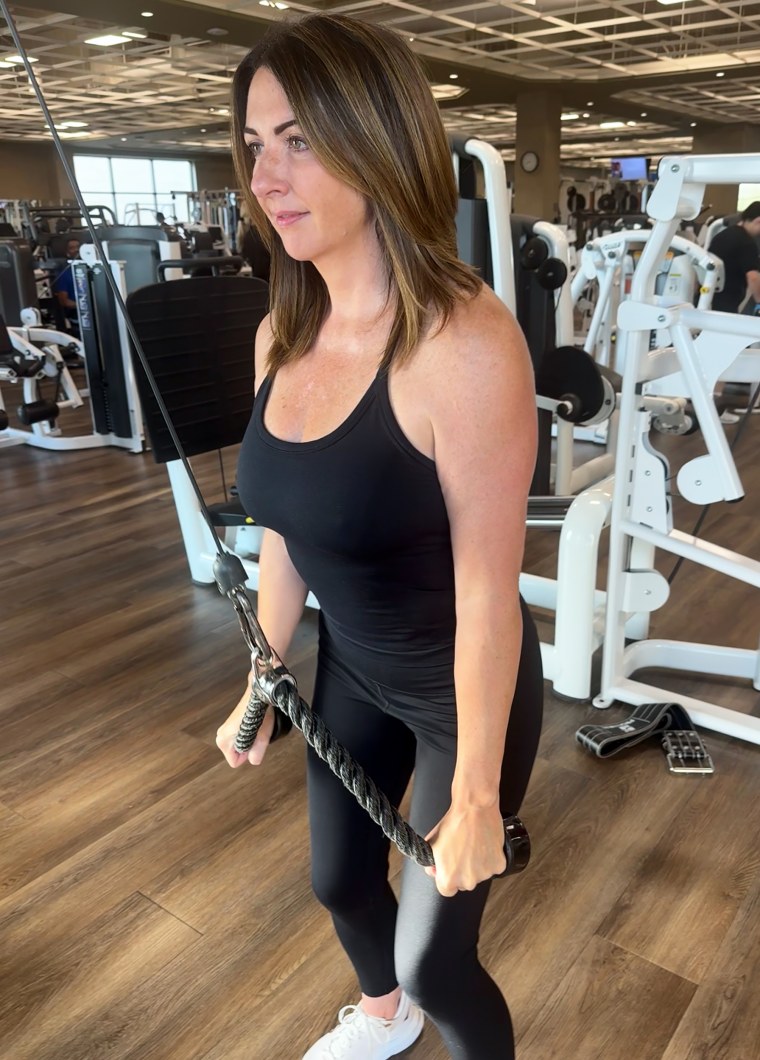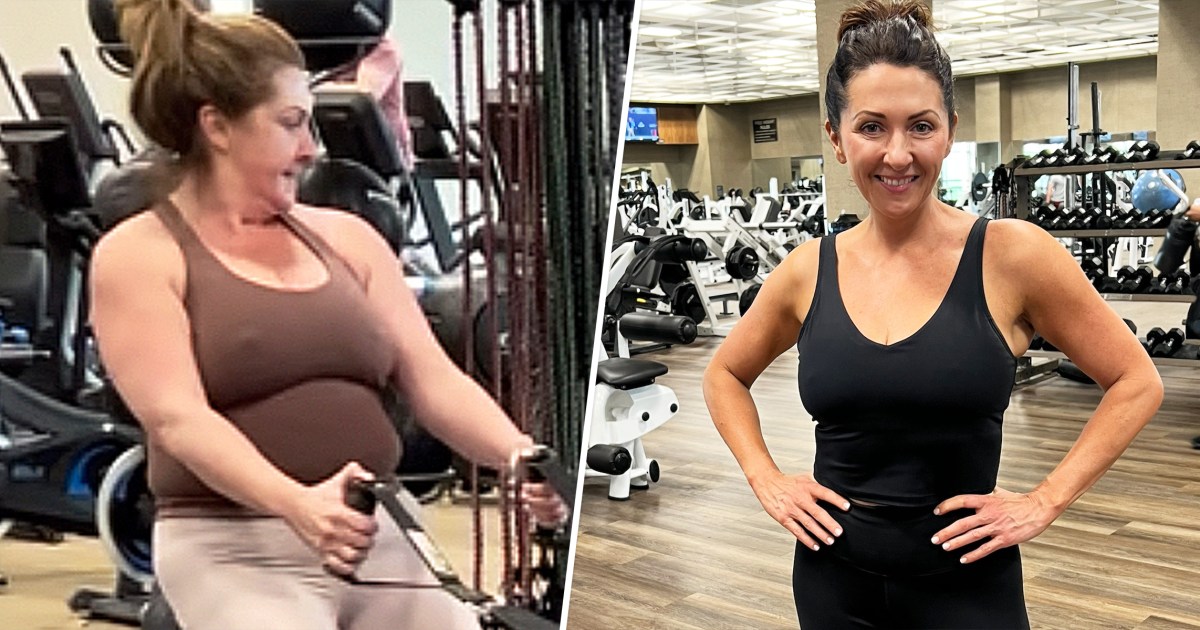Welcome to Start TODAY. Sign up for our Start TODAY newsletter to receive daily inspiration sent to your inbox — and join us on Instagram!
Bridget Cacciatore couldn’t understand why she was gaining weight. “I’ve always eaten low carb, low sugar and low alcohol. I don’t smoke. I don’t drink soda. Working out has always been a staple in my life, from running the Chicago Marathon in 2009 to running half marathons to focusing on my cardio workouts,” she tells TODAY.com.
For most of her life, she had been able to maintain her weight: “I never struggled with my weight, ever. I was not even a person who put on a lot of weight during pregnancies.” But over time, her weight reached 175 pounds.
Despite her healthy habits, she’s faced some medical issues. She has polycystic ovary syndrome (PCOS), insulin resistance and Hashimoto’s disease, a condition where your thyroid doesn’t work properly.
She also had a bowel resection to treat chronic diverticulitis and an emergency hysterectomy to treat a large fibroid. Three years ago, she had her right ovary removed to treat a large cyst.
Looking back, Cacciatore, now 49, can see that her health problems and surgeries may have led to her weight gain. “I never really felt right after I had the hysterectomy and the ovary removed. It seemed like my hormones were out of whack. I kept going to the doctor, seeing the endocrinologist, seeing the gynecologist, seeing the internist, and nobody wanted to help me. I kept gaining more weight,” she says.
She no longer had the high energy levels she could rely on in the past. She wasn’t sleeping well. “I felt like I was walking on quicksand every day. I felt heavy all the time, everywhere. My rings didn’t fit. My joints hurt. My body was just not happy with me,” she says.
I felt like I was walking on quicksand every day. I felt heavy all the time.
Bridget Cacciatore
These issues started to affect her mental health: “I was a little bit defeated and depressed. I didn’t really want to go out because I couldn’t fit into any of my clothes. I was embarrassed. How could I have gotten up to 175 pounds?”
She started strength training and stuck with cardio, at first
Cacciatore gave up on trying to lose weight — she thought she just needed to accept the changes in her body as she got older. But she wanted to be stronger, healthier and more energized, so she joined Life Time near her home in the Chicago suburbs.
She thought she wouldn’t want to work with a female trainer — she didn’t want to spend her sessions chatting with another woman rather than focusing on her workout. But seeing personal trainer Juliet Rodriguez changed her mind. “She had a strong vibe, like she wasn’t going to take any BS from anybody,” Cacciatore says.

She started strength-training sessions with Rodriguez, and continued working with her doctors to look for ways to get healthier.
“I was at the point where I would try anything. I begged my gynecologist to put me on metformin,” she says. Metformin is a medication for diabetes that some people with PCOS use to help regulate their blood sugar. “He agreed, but he also wanted me to try Nutrisystem.”
For a month, she thought she did everything right. She followed the diet plan, had two strength-training sessions a week with Rodriguez, and went all-in on cardio, with about 11 workouts a week. The result? She gained seven pounds. “I felt defeated,” she says.

Clean keto and walking made the difference
Desperate, Cacciatore saw another doctor — this time, one who specialized in weight loss. “It wasn’t until May 25, 2022, that I finally got the courage to go see the weight-loss doctor. I sat in there and cried,” she says. “But I couldn’t stop until I found someone who would listen to me. A lot of doctors treat the human body — they don’t necessarily treat the person or how the person is feeling.”
This doctor recommended a “clean keto” diet — a low-carb diet centered around healthy fats, protein and vegetables. He also wanted her to stop all her intense cardio exercise and to stick with strength training and walking.
If I wasn’t soaking with sweat or working out for two hours a day, I didn’t feel like I had a good workout.
Bridget Cacciatore
Taking a step back from cardio was tough for the former marathoner. “If I wasn’t soaking with sweat, or I wasn’t working out for two hours a day, I didn’t feel like I had a good workout,” she says. But it was possible that the intense cardio workouts were raising her cortisol levels too much, triggering inflammation and weight gain.
Rodriguez says, “There’s a reason cortisol is in our bodies, but if your body doesn’t already regulate your hormones, like with Hashimoto’s disease or insulin resistance, cortisol can increase your inflammation response and keep it elevated throughout the entire day. Omitting the cardio might help reduce the inflammation response in the body.”
Those changes worked. Cacciatore’s weight didn’t come off overnight, but she stopped gaining and started to feel better. In a year, she lost 45 pounds and became stronger and healthier.
“We took a picture and compared it to the year before. I didn’t even look like the same person. It was a great transformation. The strength training has changed my entire body more than running ever did,” she says. “And eating a low-sugar, low-carbohydrate, lean protein and vegetable diet has really helped me. My body just does not like sugar.”
